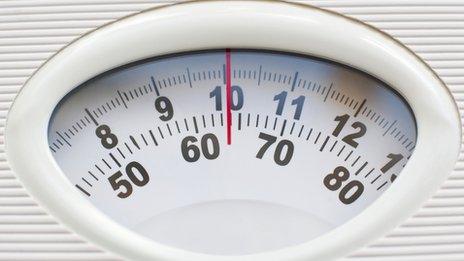BMI obesity measure 'needs to be lower' for millions in UK
- Published

BMI is calculated as weight (in kilograms) divided by height (in metres) squared
Millions of people from ethnic minority groups who may be at risk of weight-related diseases are not showing up as obese under current tests, experts say.
Medical advisory body NICE says the method of calculating body mass index does not work for some groups.
And it wants the BMI "fatness" thresholds to be lowered to ensure up to 8m people of African, Caribbean and Asian descent in the UK are covered.
NICE says it would help identify those at risk of diabetes and heart disease.
BMI assesses weight relative to height.
NICE says a lower BMI threshold should be used as a trigger for action in people from ethnic minority groups since they are more prone to such diseases.
BMI 'meaningless'
For good health, ethnic minority groups need to be slightly slimmer for their height than people who are white.
NICE says the typical healthy BMI score of 18.5-24.9 is meaningless for people of African, Caribbean and Asian descent, and suggests a range of 18.5-23 instead.
It also wants a lower cut-off for the "obese" category. It says for ethnic minority groups that means a BMI score of 27.5 or more, rather than 30-plus.
Professor Mike Kelly, director of the Centre for Public Health at NICE, said: "Type 2 diabetes, heart disease and stroke are potentially life-threatening conditions, which people of African, Caribbean and Asian descent and other minority ethnicities are significantly more likely to develop than the wider population.
"So it's vital that local authorities are supported in taking action to prevent these illnesses in people who have a high risk of developing them.
"Not only are people from these ethnic backgrounds up to six times more likely to be diagnosed with type 2 diabetes, they are 50% more likely to die from cardiovascular disease. And they also suffer from these conditions at a younger age."
- Published3 July 2013